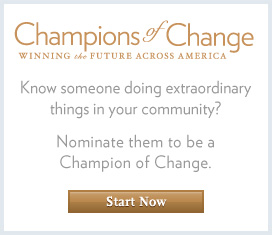Champions of Change Blog
Citizenship: A New Strategy for Financial Inclusion and Inclusive Economic Growth
Posted by on October 30, 2014 at 12:59 PM EST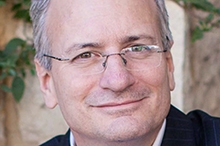
Bob Annibale is being honored as a Promoting Citizenship in the Workplace Champion of Change.
At Citi, we are focused on innovative and practical solutions to ensure that communities have access to resources and opportunities that enable them to achieve their potential and to climb up the economic ladder. Immigrants are, historically and increasingly, a dynamic part of our neighborhoods, and their financial success is directly tied to our nation’s economic growth. That is why Citi joined the mayors of Chicago, Los Angeles. and New York, as well as The Center for Popular Democracy and The National Partnership for New Americans, as the founding corporate partner of Cities for Citizenship.
Cities for Citizenship is a major national initiative that recognizes the contribution of immigrants and how citizenship can serve as an economic asset. It aims to increase citizenship among eligible U.S. permanent residents, as well as encourage cities across the country to invest in citizenship and financial capability programs.
On behalf of Citi, I am honored to be named as a Champion of Change by the White House. But I must share this recognition with all of my coworkers at Citi and with our partners who have provided critical national leadership, especially Mayor Bill de Blasio, Mayor Rahm Emanuel, and Mayor Eric Garcetti.
Our shared goal is to increase access to legal and financial services and contribute to enabling more inclusive cities across the country. Through this program, cities and their community partners will deliver financial counseling, legal support, application guidance, naturalization test preparation, and other assistance to eligible immigrants.
This initiative and partnership will enable immigrants to build a valuable financial identity as they also pursue a national identity. This is critical since the Federal Deposit Insurance Corporation reports that about 20 percent of foreign-born households have never had a bank account, which has driven immigrants to use alternative financial services that often come with higher costs and risks. Instead, Cities for Citizenship aims to build a stronger foundation for the American Dream.
Moreover, it is a strategy that makes good economic sense.
There are approximately 8.8 million legal permanent residents in America who are eligible for citizenship. These are documented residents who pay taxes and work lawfully. Yet, 52 percent of them remain low-income. Their naturalization would provide access to better-paying jobs, academic scholarships, and other benefits. It would also provide billions of dollars in stimulus to the national economy over the next few years.
This would mean up to $1.6 billion for Chicago’s economy, $2.8 billion for the Los Angeles economy, and a $4.1 billion boost for New York City’s economy, according to the report “Citizenship: A Wise Investment for Cities.”
Cities for Citizenship considers citizenship and immigrant integration as powerful platforms to promote widespread financial inclusion and truly inclusive economic growth. We are excited to work with more municipalities on this project and share the collective efforts of our partners with The White House.
Bob Annibale is the Global Director of Citi Community Development, which leads Citi's initiatives and partnerships supporting inclusive finance.
Learn more about ImmigrationAt the Intersection: Community, Policy, and Engagement
Posted by on October 27, 2014 at 9:35 AM EST
Niiobli Armah IV is being honored as an Affordable Care Act Champion of Change.
Since the inception of the Affordable Care Act, the NAACP has remained committed to ensuring that communities of color understand the benefits provided by the ACA and the importance of its implementation. The NAACP began by forging a number of partnerships with organizations across the nation to guarantee that communities of color remain a priority demographic for the implementation of the ACA. The NAACP Board of Directors passed a resolution identifying health coverage as a critical civil rights issue and mandating that all 38 state conferences in the organization facilitate workshops around the ACA at their fall 2013 conventions. We have focused on making sure communities of color are aware of their options under the ACA and have opportunities to participate in Open Enrollment activities.
I have found that ACA outreach is most successful when we focus not on health care but rather on upward mobility and quality of life. At its essence, health care affords millions of Americans the opportunity to go to work daily and provide for their families. Health insurance is a safety net that is often taken for granted. In designing our outreach strategy, I knew that we had to build a narrative that resonates with our communities.
The issue of health disparities naturally rose to the surface. People of color are diagnosed later than others, and they often die early from preventable diseases. Getting other organizations to understand the uniqueness of engaging communities of color has been a high priority for our outreach efforts. Organizations have struggled with what they define as “hard to reach communities,” but I believe there is no such thing as a community impossible to reach. After participating in many meetings with organizations thinking through community engagement, I have come to understand that the traditional approach needs adjusting. Singular interventions and initiatives focused on one particular issue are less successful than those that are more comprehensive and view an issue in its totality. Neither advocacy groups nor the communities they serve have the option of choosing what issues will take priority. For example, the same communities experiencing poor health outcomes are simultaneously dealing with issues of unemployment, education, violence, and mental health.
The second Open Enrollment Period begins on November 15, and we charge ourselves and other community organizations to find innovative ways to bring the important message of health care to the constituents they serve. No longer can we operate within silos by choosing what issue areas communities should prioritize. Instead, we must find the intersection of multiple issues so that we can address community problems holistically. To appropriately address health equity, more work must be done at the interaction of multiple issues.
Niiobli Armah IV is the Director of Health Programs for the National Association for the Advancement of Colored People.
Learn more about Health CareThe Impact of Positive Change
Posted by on October 27, 2014 at 9:35 AM EST
Vanessa Abernathy is being honored as an Affordable Care Act Champion of Change.
Each generation has contributed to the social, political, and economic change that has made America great. I have been privileged to witness one of the greatest periods of change in American history, as well as to make a contribution to it by supporting the implementation of the Affordable Care Act. I am honored to be nominated as a White House Champion of Change and would like to thank Get Covered America for the opportunity to serve my country.
The objective of the Affordable Care Act is to provide everyone with access to affordable health insurance. We are achieving this goal through positive and peaceful change. ACA was enacted after a nationwide discussion about what health insurance should look like. There were heated town meetings in communities across the nation. We witnessed negotiations and opinions from the medical industry, unions, and elected officials. We saw our democracy in action with the passage of ACA and are still experiencing peaceful and positive change as challenges to the law are argued in the judicial system.
The national movement to ensure affordable health insurance for all Americans has been a life-changing experience for me. I have joined thousands of volunteers throughout the country going door-to-door and church-to-church, asking my neighbors if they know about ACA and if they need health insurance. That personal contact reminded me of so many historic campaigns that required volunteers to spread the word and call Americans to action. It has been a humbling experience for me to join thousands of volunteers all over the country to help our fellow Americans understand how the ACA Marketplace works, that financial assistance is available, and that there are people certified by the federal government to help them navigate the process.
I moved to Fairmont, North Carolina, in May 2013 and started my volunteer work with Get Covered America the following August. I spoke to churches and media outlets. I distributed flyers and talked to customers in small businesses, including nail salons, restaurants, professional service firms, and beauty shops. I felt a particular sense of pride and fulfillment when I visited Spanish-speaking businesses and offered flyers written in Spanish about ACA and local enrollment events because I knew that we were doing our best to reach out to all Americans.
I’ve worked in six counties in southeast North Carolina. I’ve traveled hundreds of miles spreading the word about the Affordable Care Act and the importance of health insurance and helping to organize enrollment events. But I haven’t been alone in this movement. Pastors and community leaders have opened doors to me. Friends and family have continually reaffirmed my work. And Navigators and certified application counselors have been partners in supporting insurance enrollment under ACA.
Our work is not over. The second open enrollment period for insurance under the Affordable Care Act begins on November 15, 2014. Mahatma Gandhi is paraphrased as saying, “You must be the change you wish to see in the world.” We all can impact the future of our country through volunteering and advocating for positive change.
Vanessa Abernathy works on Affordable Care Act outreach in North Carolina.
Learn more about Health CareYou Too Can Make a Difference
Posted by on October 27, 2014 at 9:35 AM EST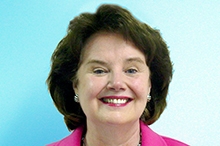
Pat Halpin-Murphy is being honored as an Affordable Care Act Champion of Change.
I am truly grateful to have been selected as a White House Champion of Change. I can’t tell you how much it means to me to be honored with this award.
As the President and Founder of the Pennsylvania Breast Cancer Coalition (PBCC), I lead a non-profit organization dedicated to finding a cure for breast cancer now so that our daughters won’t have to. I’m a breast cancer survivor, and twenty-five years ago when I was diagnosed I found that there wasn’t an organization in Pennsylvania dedicated to supporting women and families facing breast cancer. I founded the PBCC in 1993 to fill this void. In our twenty-year history, the PBCC has paved the way for countless legislative victories that support women and families across the state.
The best part of my work is talking to women about their experience with breast cancer and finding out what we can do to help meet their needs. For instance, we learned that many women were diagnosed with breast cancer in late stages because they have dense breast tissue. Upon learning this, we didn’t just sit by and wait for something to be done. Rather, we sprang into action and convinced Pennsylvania State Senator Bob Mensch to introduce legislation to help women with dense breast tissue receive improved information and screening so that they could be diagnosed at an earlier stage.
I believe that we all have the capacity to make a difference in our communities. Former U.S. Senator Harris Wofford made a tremendous impression on me as a leader. He recognized that each person has so much to contribute if only given the opportunity. He listened to people’s ideas and encouraged them to make those ideas become realities. Senator Wofford believed that everyone could contribute to their community. I truly believe that we can all make a difference. That’s the best part of this work. I’ve come to realize that, by simply standing up and taking action, we can all be “Champions of Change.”
Pat Halpin-Murphy is the President and Founder of the PA Breast Cancer Coalition.
Learn more about Health CareMiami Dade College Leads with Initiative to Reach Students and Engage Community
Posted by on October 27, 2014 at 9:35 AM EST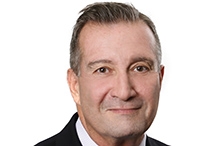
Joe Pena is being honored as an Affordable Care Act Champion of Change.
Miami Dade College (MDC) is the higher education institution with the largest campus-based enrollment in the United States, serving more than 165,000 students. Under the leadership of its president, Dr. Eduardo J. Padron, the institution has been elevated to national prominence for its innovation, programs of excellence, and service to the community.
President Padron designated me to coordinate a college-wide initiative to educate students, faculty, and the local community about their options under the Affordable Care Act. I was incredibly motivated to work on this project. Early on, we formed a partnership with Get Covered America, which sparked local community organizations and volunteers to assist with our efforts. We organized a series of successful educational outreach events, including workshops on multiple campuses. These events provided key information and enrollment assistance to all with an interest in signing up for health insurance.
The informational workshops were held on Saturdays and weeknights in the computer courtyards of four of our campuses stretching across all of Miami-Dade County. Holding these workshops in our computer courtyards allowed the trained assisters to educate the participants, explain the enrollment process, and answer questions directly.
Although I spearheaded this initiative, it came together as a result of the contributions of many in our institution. For Miami Dade College, this was an “all hands on deck” project focused on our students and local community. From our College and campus leadership to our administrators to our computer technicians and support staff, we were all motivated to pitch in, educating and assisting others about their health care options. The College District Office of Communications played a key role in announcing our outreach activities, generating media attention, and encouraging all to visit the HealthCare.gov website.
In the next enrollment period, we plan to once again partner with Get Covered America and the other community organizations to run educational workshops and to engage our communications network. In addition, we are organizing “office hours” on our campuses, allowing students and community members to set up individual enrollment assistance appointments with the trained assisters from the community organizations.
This MDC initiative is credited with having made a significant impact, improving the access to health care for thousands of residents in Miami-Dade County and throughout South Florida. I am proud to have been a part of this effort and to have been designated a “Champion for Change”.
Joe Pena is the Director of Federal Relations for Miami Dade College.
Learn more about Health CareUsing Partnerships to Reach Into Communities
Posted by on October 27, 2014 at 9:35 AM EST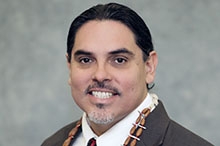
Mark LeBeau is being honored as an Affordable Care Act Champion of Change.
In California, tribal governments, tribal health programs, and the California Rural Indian Health Board (CRIHB) worked together to develop and share educational materials about the Affordable Care Act prior to its passage. Upon enactment of the ACA, CRIHB partnered with the Northwest Portland Area Indian Health Board, Oklahoma City Area Inter-Tribal Health Board, and United South and Eastern Tribes to develop tribal-specific educational materials about the legal rights of tribes and American Indian and Alaska Natives (AIANs) under the ACA. These partners each contributed funds to help make this work a reality.
This program became known as the Tribal Education and Outreach Consortium (TEOC). The people involved in this work became highly knowledgeable about the subject matter and formed a training program called TEOC University, which trained trainers to present the information to tribal communities. This was the first tribal work of this type in the United States, and the TEOC materials have been distributed throughout Indian Country.
Today, a number of federal and state offices provide these materials. Many of these materials have been reviewed and updated by CRIHB and the other members of TEOC. One of the most well-known programs we’ve helped with has been the National Indian Health Outreach and Education Initiative (NIHOE). This is a partnership between the Indian Health Service (HIS), the National Congress of American Indians, the National Indian Health Board, and representatives from each of the 12 IHS Areas. The partnership develops consumer-oriented materials to assist AIANs in understanding their opportunities under the ACA. Together, the partners provide local trainings, national marketing tools, and e-resources that clearly explain health reform changes and their impact on tribal communities. CRIHB has presented these materials to tribal governments, Indian health programs, and Indian communities and organizations.
To ensure the successful roll-out of the ACA in California, CRIHB policy staff have been meeting with state officials on a regular basis. In addition, CRIHB has reached out to the Northwest Portland Area Indian Health Board (NPAIHB) for input in developing successful implementation strategies and tactics.
These strategies and tactics were incorporated into a proposal developed by CRIHB, which was presented to the state as a necessary and fundable ACA program. Eventually, the state agreed to fund our program. As a result of this work, the Covered California Tribal Community Mobilization program was created and funded at $250,000. The grant designated funds to support implementation of the ACA AIAN provisions and to meet the tribal consultation requirements outlined in federal guidance. While this grant will end in December of 2014, I and the rest of the folks at CRIHB will continue to seek additional financial resources in order to continue to implement this important work for Indian Country.
Mark LeBeau is Executive Director at the California Rural Indian Health Board.
Learn more about Health Care
- &lsaquo previous
- …
- 9
- 10
- 11
- 12
- 13
- 14
- 15
- 16
- 17
- …
- next &rsaquo

